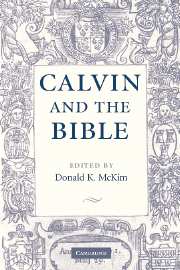Book contents
- Frontmatter
- Contents
- Notes on contributors
- Preface
- List of abbreviations
- 1 Calvin as commentator on Genesis
- 2 Calvin as commentator on the Mosaic Harmony and Joshua
- 3 Calvin as an interpreter of Job
- 4 Calvin as commentator on the Psalms
- 5 Calvin as commentator on the Prophets
- 6 Calvin as commentator on the Synoptic Gospels
- 7 Calvin as commentator on the Gospel of John
- 8 Calvin as commentator on the Acts of the Apostles
- 9 Calvin as commentator on the Pauline epistles
- 10 Calvin as commentator on Hebrews and the Catholic Epistles
- 11 John Calvin as an interpreter of the Bible
- Index
1 - Calvin as commentator on Genesis
Published online by Cambridge University Press: 09 November 2009
- Frontmatter
- Contents
- Notes on contributors
- Preface
- List of abbreviations
- 1 Calvin as commentator on Genesis
- 2 Calvin as commentator on the Mosaic Harmony and Joshua
- 3 Calvin as an interpreter of Job
- 4 Calvin as commentator on the Psalms
- 5 Calvin as commentator on the Prophets
- 6 Calvin as commentator on the Synoptic Gospels
- 7 Calvin as commentator on the Gospel of John
- 8 Calvin as commentator on the Acts of the Apostles
- 9 Calvin as commentator on the Pauline epistles
- 10 Calvin as commentator on Hebrews and the Catholic Epistles
- 11 John Calvin as an interpreter of the Bible
- Index
Summary
Calvin first published his commentary on Genesis in 1554, and published it again with revisions with his Harmony on the Last Four Books of Moses in 1563. The commentary continued Calvin's interpretation of the Hebrew Scriptures that began with his Commentary on Isaiah of 1551, which was itself to be republished in a revised and enlarged edition in 1559. Calvin likely began work on the commentary on Genesis in 1550, when he gave a two-year cycle of lectures on the book. However, at the same time that Calvin was preparing the commentary on Genesis, he was also finishing his commentary on the epistles of the New Testament (1551), as well as the first part of the book of Acts (1552) and the Gospel of John (1553). In the same year that the Genesis commentary appeared Calvin also published the second part of his Acts commentary, and a year later he published his harmony of Matthew, Mark, and Luke (1555), along with a completely revised edition of all the other New Testament commentaries. Thus the Genesis commentary is but one part of a massive publication effort of Calvin during this period, in which he sought to finish his interpretation of the New Testament (excluding 2 and 3 John and Revelation), and to begin his interpretation of the Hebrew Bible.
Calvin was embroiled in several controversies during the preparation and production of the commentary on Genesis, all of which leave their mark on the commentary.
- Type
- Chapter
- Information
- Calvin and the Bible , pp. 1 - 29Publisher: Cambridge University PressPrint publication year: 2006
- 4
- Cited by



